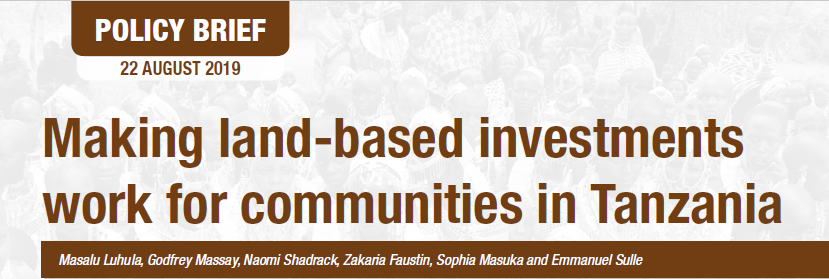GSI - ICCA PROJECTS STRENGTHENED TRADITIONAL AND FORMAL INSTITUTIONS ON GOVERNANCE OF NATURAL RESOURCES AND IMPROVED LIVELIHOODS IN VARIOUS ECOSYSTEMS IN TANZANIA
evaluation.jpg

TNRF in collaboration with UNDP and Indigenous Community Conserved areas (ICCAs) Experts in Tanzania conduced joint monitoring, documentation and mentorship in the various ICCAs projects from 21-28 October 2020 with the purpose of providing technical support to the relevant ICCAs projects staffs, monitoring and documenting their progress in their respective project area The mission include making discussions with the respective project staff, district staff and thereafter making field visits to discuss with some project beneficiaries on the status of implementation and results of specific GSI-ICCAs support project. The Mentorship was to ensure ICCAs partners focused and familiar with the approach and processes of self-strengthening processes, and also Documentation of best practices, and case studies.
The mission conducted monitoring, documentation, mentorship in the followings ICCAs projects in the following ICCAs:
- Communal Forest Rangelands at Mongo wa Mono Forest on Secure Communal Forest for social Cultural Heritage
- Lengiloriti and Engorika grazing land on Secure Communal Rangelands in Northern Tanzania
- Kitumbeine forest-longido on Restoration of natural forests along kitumbeine mountains
- Batemi valley-in Loliondo on Enhancing sustainable conservation of water catchment and social cultural Forestry
- Enguserosambu community forest-loliondo on Indigenous knowledge in community-based forest.
- Serian community forest -Loliondo on Increasing participation of women in community forest management in Serian community.
- Suledo-Kiteto on Suledo salama kwa faida ya jamii
- Olengapa-Kiteto on Olengapa nature improvement.
The mission realized the following lesson leant and immediate impacts:
- Increased understanding and practice of indigenous knowledge systems in forest communities to protect the forest as well as their culture and lifestyle is crucial in appreciating its role in managing the forest resources for the benefits of ecosystem and people.
- Policy geared towards naturing capacity building and social capital improvement to the community is important to ensure that their conservation efforts are sustainable and result are felt both at local and national levels.
- Empowering women in forest sector and rangeland yield significant benefits to the sustainable management of the forest and rangeland as they facilitate women participation in forest user groups and rangeland of women-based platforms, improving their access to and control over forest and rangeland resources and economic opportunities available to them.
Improve climate change resilience from engagement of women and indigenous people from income generating activities that sustain various ecosystem
- Actively use traditional laws and practices which are strong enough to strengthen the management of community forest reserves this is through full use of the traditional leaders who as are trained more on the importance of the forest and deliver knowledge to their community members These leaders have the ability to solve and mediate conflicts in the villages they are working and that make sure they advocate them.
- Emphasize on documentation of good traditional practices with the related laws compared to modern bylaws should be done this can demonstrate how traditional laws are strong as their penalties are very strong and can be used in future generations also can help in conservation of natural resources.
- Involvement of marginalized groups in forest management and in decision making process.
- Activities being implemented at the ground level which can be shared between the projects. It is therefore recommended that a cross – sharing of information between the projects be promoted (within project staff and within community members land use occupancy mapping and land use plans with focus on intangible benefits (indigenous cultural and spiritual sites). Themes of these studies are very interested and shows different trends in changes of land use over time, areas where there is concentration of different wild animals and changes in water flows just to mention a few.
- For total protection of the community reserved forest there should be direct and tangible local community incentive for the whole community to engage them fully protection and management the forest.
- Training should be given to all project implementing staff before they start work on the ground to align the project community needs and relate the activities of the project. After the training a face to face discussion should be made to clarify the understanding of what they are supposed to do as it is a project which is aimed at strengthening the beneficiaries of the resource.
The role of traditional institution of indigenous people in sustaining ecosystem is key for sustainably of natural resources in various TNRF is a national catalyst organization in Tanzania under Global support Initiatives of Indigenous Community Conserved areas (GSI_ICCAs) to pilot ICCAs in Tanzania to enhance partners, members and indigenous community on ICCAs strengthening process. In 2019-2020, TNRF and UNDP supported 13 ICCAs members across the country to strengthen their ICCAs.

